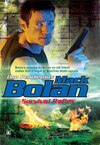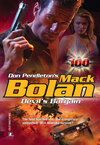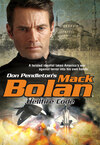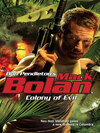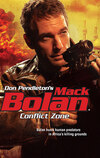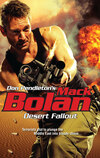Kitabı oku: «Survival Reflex», sayfa 4
“Senhor Downey—”
“Before you get all territorial, they have information that can help you wrap this up, okay? They’ve seen the new kid on the block, this guy recruited by your woman for whatever reason.”
“She is not my—”
“Anyway, they’ve met him. They can spot him, where your men might think he’s just another gringo tourist looking for some action.”
“Photographs would do as well,” Herreira said.
Downey ignored him, saying, “More importantly, my men can take him out with no reflection on your team.”
Herreira wasn’t easily deceived by specious arguments. The Brazilian government had no qualms about jailing foreign intruders or killing those who resisted arrest. A simple-minded blind man could’ve seen that Downey’s primary concern was to prevent embarrassment for the United States.
The doctor had been bad enough, but if he’d started to recruit allies from the U.S., some might regard it as more than intrusion. It could mean invasion, perhaps an act of war.
“Your men must willingly submit themselves to my authority,” Herreira said.
“Sure thing, Major,” Downey answered with a broad smile in his voice.
Herreira knew that he was lying, that his agents would behave as they had always done in “Third World” countries for the past two hundred years. Imagining that only the U.S. was fit to form opinions, dictate terms, decide what should be done in any given situation from Latin America to Europe and Southeast Asia.
“In that case,” Herreira replied, “I welcome their assistance.”
“That’s my boy. Expect a call within the hour.”
So, Herreira thought, they were already in Cuiabá or well on their way. His agreement, once more, meant no more to Downey than a rubber stamp on plans already finalized. He’d have to watch them every moment, to be certain they didn’t overstep their bounds.
Or if they did, and tragedy ensued, Herreira had to make sure that he couldn’t be blamed.
And if some accident befell them in the process, it was Downey’s job to deal with it, smother the breath of scandal.
Let the Yankee do his job, then. And together, they might just manage to save Herreira’s career.
“I STILL THINK it’s a bad idea,” Bolan insisted.
“Senhor Cooper, I’m Tehuelche. What you see—” the hands that smoothed her dress had polished nails “—is only one facet of what I am.”
“I understand that, but—”
“I know the jungle,” she informed him. “I was born and raised there, educated in a mission school. Your high technology may locate map coordinates, but it won’t tell you if the doctor has been forced to flee again or where he’s gone this time.”
“He’s moving?”
Marta Enriquez shrugged. “We won’t know that until we reach the meeting place.”
“I’ve done some tracking of my own, from time to time,” Bolan informed her.
“Were you hunting men?”
“Yeah, I was.”
She frowned at that. Sometimes the newbies asked what it was like, killing and almost being killed, but Enriquez had to have seen that for herself. Instead she simply asked, “Why are you here, really?”
“Bones is—or was—a friend of mine. If he’s in trouble now, I’d like to help him.”
“With no politics involved?” she asked.
“The man I knew wasn’t concerned with politics. He was a healer.”
“Tell me why you call him ‘Bones.’”
Bolan explained, briefly. When he was done, she asked, “And you would help him, even if he now heals those who might be enemies of the United States?”
“If he needs help—wants help—I’ll do my best. I didn’t come to join a cause or fight against one. If there’s fighting to be done, though, you’ll be in the way.”
“In any case,” she said, “it makes no difference. I have supplies for Dr. Weiss. If I don’t go with you, then I must go alone into the forest.”
Bolan saw that argument was futile in the face of such determination. He had no doubt that Marta would proceed without him, and it was entirely possible that she’d withhold Weiss’s location if Bolan refused to cooperate.
At last, resigned, he said, “All right. We need an early start tomorrow.”
“Is dawn early enough?” she asked him, smiling.
“Just about.”
“I’ll let you sleep, then.” At the door of Bolan’s hotel room, she paused and turned. “What if they follow us, your people?”
It was Bolan’s turn to shrug. He didn’t think he’d seen the last of Downey’s people yet. “I shook them once,” he said. “I can do it again.”
But shaking might not do it in the jungle. He might have to bury them, if they were bent on doing some irrevocable harm to Nathan Weiss or to himself. It wouldn’t be the first time he’d clashed with Company spooks, where lives were at stake.
“I hope you can do it,” she answered. “They may be here already.” And having said that, she slipped out of the room.
Alone, Bolan got busy with his fear. He would be wearing street clothes when they left the following day, in Enriquez’s car, but he wanted his canteens full and his weapons ready to go. He’d change clothes when they reached their jumping-off point, where they’d have to ditch their wheels and take to water, then proceed on foot. There were no roads where they were going, yet.
What was waiting for them at the end of the trail?
A friend, perhaps—or maybe not.
Time changed minds, hearts, people. Bolan didn’t think that Nathan Weiss had been transformed into a villain or mad scientist since they’d last seen each other, but it was entirely possible that Bones had found himself a cause to follow. And it might be one that ran against the grain with Bolan, one way or another.
Insurrection, revolution—the American tropics bred them like fever. Most countries south of the Rio Grande had battled their way through long series of rebellions, civil wars and military juntas over the past two centuries, and some were still embroiled in that struggle. Brazil had seemingly beaten the trend.
Bolan would see what waited for him when he reached trail’s end, and not before. Meanwhile, he needed sleep, in case he couldn’t find it in Green Hell.
CHAPTER FIVE
Cuiabá
“I hope the dirty SOB resists,” Dirk Sutter said.
“I’m counting on it,” Clement Jones replied.
They sat together in a plain brown van, with three secret police types huddled in the back. Waiting. Jones had a MAC-10 submachine gun in his lap, fat sound suppressor extending its abbreviated muzzle, but the weapon still looked almost toylike in his black-gloved hands. Sutter had picked a micro-Uzi, likewise silenced, and was feeding it a magazine of Parabellum hollowpoint rounds.
“It needs to look good, though,” Sutter remarked.
“That’s why we brought the three amigos,” Jones reminded him.
The locals all spoke English, more or less, but Jones saw no reason to spare their feelings. He was an American, for God’s sake. Anywhere he set his feet was home, thanks to the megabillions spent on foreign aid and the new atmosphere of militancy prompted by the War on Terror.
It wasn’t the natives he worried about, sitting sweaty and tense in the van. He worried about Downey and the man they’d come to neutralize.
Jones still wasn’t sure how Downey had zeroed the target’s hotel in Cuiabá. Some kind of high-tech hocus-pocus, he supposed, or maybe an old-fashioned squeal from an informant. Either way, they had his crib on quarantine, nobody in or out, and in another five minutes or so they would be going in to smoke him out.
Or waste him, as the case might be.
Downey had given them some latitude, after the fuck-up in Belém. He wasn’t letting them forget it—likely never would, the bastard—but at least he hadn’t sent them out unarmed this time. They were prepared, complete with reinforcements duly authorized to make arrests.
Not that he planned on taking Mr. Hot Shit into custody.
Not even close.
There’d been a time when asshole bullies used to get their kicks by stuffing Clement Jones in lockers, trash cans and the like, but Jones had turned that trend around by pumping iron for two years straight, then kicking ass and taking names. To save himself from bullies, he’d become a bully, and his path was set for life.
Until the moment in Belém, when all his muscle got him was a headache and the stink of garbage in his hair.
Somebody had to pay for that insult, the damage it had done to him in Downey’s eyes, and one Matt Cooper was about to rue the day he ever fucked with Clement Jones.
But Jones was nervous, sweating through his lightweight suit despite the early morning chill. The three studs waiting on the van’s rear bench seat seemed immune to nerves, but Jones saw Sutter fidgeting behind the steering wheel. Jones wasn’t psychic, but he had a fair idea of what was going on in Sutter’s head.
He didn’t want to give this Cooper prick another chance to kick their asses, nothing hand-to-hand unless the guy surrendered and they got him handcuffed. Maybe tune him up a little then, to settle scores, but if he offered anything resembling physical resistance, they would put him down.
Case closed. No second chances.
“Room 228, you said?” he asked Sutter.
“You got it.”
“And the woman’s in 230?”
“Right next door,” Sutter replied. “Connecting rooms, for all I know. Maybe they’re playing house. Guy wants to change his luck.”
“It’s changed, all right,” Jones said.
Sutter glanced over at him from the driver’s seat. “Remember, now, the first move’s his. We’re playing by the rules.”
“No sweat.”
It wouldn’t have to be much of a move, Jones thought. The prick could blink his eyelids, maybe clear his throat, and that was all the physical resistance it would take to spark a storm of automatic fire.
Their cleanup gear included body bags.
Jones didn’t really care about the woman, one way or the other, though the trouble had begun with her. He wished someone had taken care of her in San Diego, maybe left her in the desert with the others who were robbed and killed crossing the line from Mexico. It would’ve been the easy way, but no one thought of it.
Dumb bastards.
Now Jones had to kill a man who’d kicked his ass and dropped him in a garbage Dumpster. Maybe kill the woman, too, though she’d done nothing to offend him yet.
“It’s time.”
Sutter was out and moving, even as he spoke, tucking the micro-Uzi underneath his jacket. Jones opened his door, half turning toward the goons in back, and said, “Let’s rock and roll, amigos.”
They breezed through the lobby without opposition, rode the elevator up two floors, and followed the wall-mounted arrows to their target. Jones and Sutter took the door to Cooper’s room. Their three companions, pistols drawn, staked out the entrance to the woman’s crib. On three they kicked both doors and rushed inside, shock troops of the apocalypse.
And found both rooms deserted.
“Shit! He isn’t gonna like this,” Sutter said.
Jones scanned the empty hotel room and muttered, “That makes two of us.”
THEY WERE MAKING fair time, but Bolan still wished the old riverboat could’ve gone faster. Its diesel motor labored, fouled the air around them, and propelled them at a steady four to five knots with the current, but he’d hoped for more.
Broad daylight now, and if the Company was looking for them in Cuiabá, then its spooks would soon know they were gone. The question would be where, and Bolan wished they could’ve gained a better lead before the hunters started tracking them afresh.
An airlift would’ve done the trick, but Marta didn’t skydive and she’d finally convinced him that trackers would waste more time questioning Cuiabá’s several thousand river rats than checking out a hundred-odd bush pilots. It made sense and gave the warrior time to think.
But he still wished for speed.
The Rio Cuiabá flowed southwestward from the city that shared its name, winding through primal forest toward the Bolivian border, where it met and fed the Rio Paraguai. Bolan and his companion didn’t plan to follow it that far, however. They were landing fifty miles downriver and would hike from there, through wilderness that one early explorer had described as “Hell on Earth and Eden, all rolled into one.”
So far, it wasn’t Bolan’s notion of a holiday.
It felt like coming home.
Bolan had grown up in a jungle, spilled his first blood there and earned the nickname that would follow him through life, even beyond his early grave. That jungle was located on the far side of the world, but all of them were more or less the same. The predators and prey varied by continent, but it was still survival of the fittest in a world where no quarter was asked or granted.
The one rule carved in stone was kill or be killed.
Bolan knew that rule by heart, and he was still alive.
The captain of their boat ignored them after he’d collected cash up front, which suited Bolan perfectly. He lingered at the rail and watched the forest pass, unscrolling like the background footage in a wildlife film. Bright-colored birds hovered or swooped among the trees, while monkeys swarmed and chattered. Caimans waited on the bank for fish or careless swimmers to present themselves.
Forest primeval. Given half a chance, he knew that it would eat him up alive.
And somewhere in the midst of it was Nathan Weiss.
Bad choice, Bones, Bolan thought. And once again, Why here?
Enriquez was suddenly beside him at the railing. She’d changed into khaki hiking clothes and sturdy boots, hair pulled back from her face and cinched with an elastic band. She wore no makeup, and she didn’t seem to miss it.
Both of us were going home, Bolan thought, but it didn’t warm the cockles of his heart.
“It shouldn’t be much longer,” Enriquez told him, eyes fixed on the wall of forest opposite. “I know a place where we can stay tonight. A village. By nightfall tomorrow, with luck, you can speak to your friend.”
“After all this time,” Bolan said, “you’re a closer friend to him than I am.”
“Maybe not.”
“I’m betting on it. And I’m hoping you can shed some light on why he chose this place.”
“We’ve never talked about it,” she replied. “I felt so lucky that the choice was made, for both my people and myself. I didn’t want to question it.”
“Okay.”
“But if I had to guess,” the woman went on, “I think he feels a need to heal the world. It sounds ridiculous, perhaps.”
“Not necessarily.”
“I think, for Dr. Weiss, it’s not enough to have an office in the city or to work at an important hospital. He talks about red tape sometimes. You know of this?”
“It rings a bell,” Bolan replied.
“He hates red tape and rules. Out here, I think, he finally feels free.”
And Bolan was supposed to talk him out of it.
Welcome home.
Belém
“WHAT DO YOU MEAN, you lost them both?”
Downey could feel the anger stirring, rising through his body like a head of steam seeking an outlet, throbbing in his ears, a second pulse. He didn’t need a mirror to imagine the pink color in his face.
“Um, well, sir,” Sutter stammered over the long-distance line, “we took the team as planned and checked that address you supplied us, half-past five in the a.m. They were already gone.”
“Checked out?”
“No, sir. I asked the desk clerk, after. They just walked. Nobody saw them go.”
Was that pure luck, or had somebody put a bug in Cooper’s ear? He would’ve been expecting company, after the ruckus in Belém, but not so soon. How could he know they’d pin him down that fast?
He couldn’t, Downey thought.
Luck, then—or else, the kind of skill that made dumb luck superfluous.
“All right, here’s what you do,” he said. “Get after them. I don’t care what you have to do, just find out where they’ve gone and follow them. You understand.”
“Yes, sir. But—”
“But nothing,” Downey cut him off. “You have one job and only one. Find Cooper and the woman. If they’re hiding in Cuiabá, root them out. If they’ve gone native and they’re swinging from the goddamned trees, you grab a vine and follow them. I hope you’re reading me.”
“Yes, sir.”
“And when you find them, liquidate the problem, Sutter. Rub it out. Until that job is finished, you and Jones will not return. Under no circumstances known to God or man will I accept one more report of failure. Are we clear?”
“Yes, sir!”
“Then move your ass and get it done.”
Downey put down the telephone receiver, then immediately lifted it again. The urge to share his misery was irresistible. He dialed the number of security police headquarters from his memory, one of perhaps five hundred crucial numbers filed inside his head, and waited while his call was passed along to Anastasio Herreira’s desk.
“Está?” Herreira greeted him.
“Está, yourself. Are we secure?”
“Of course.”
“I’ve got bad news.”
“It’s the only kind you ever bring to me.”
“Somebody screwed the pooch this morning, in Cuiabá,” Downey said. “I’m not assigning blame, you understand. Mixed signals, who knows what it was. Long story short, we missed the woman and her friend at the hotel.”
“I see.” Herreira’s voice was glum.
“Now, what we need to do is find out where they’re going. Either head them off or trail them to their destination. Maybe wrap it up once and for all.”
“You make it sound like meeting old friends in the park,” Herreira said. “You think they’ll leave a trail for us to follow?”
“Everybody leaves a trail. It’s a fact of life. The trick is knowing what to look for, how to read the signs.”
“Mato Grosso is the third-largest state in Brazil, Senhor Downey, and the most sparsely populated. Outside Cuiabá—”
“I don’t need a geography lesson. I need hunters who aren’t afraid to get their hands dirty.”
Herreira lowered his voice as he asked, “What is it you propose?”
“We have a chance to wrap this up once and for all, within the next few days, if we’re not squeamish. We’ve already missed our chance to stop the woman slipping past with her hireling, but the mistake may work for us if we’re quick enough.”
“You think they’ll lead us to the doctor?”
“That’s exactly what I think. Of course, we have to find them first.”
“And I must say again—”
“Don’t tell me what you can’t do. I need a can-do attitude for this job. Think about the money Langley’s pumped into your service, and the cut you’ve skimmed off for yourself.”
“Senhor—”
“Nobody’s faulting you,” Downey said. “Hell, I know the way things work. All I’m suggesting is that you should earn a little of that money, now and then. You need to work a little overtime, put extra bodies on the street.”
“What am I looking for?” Herreira asked, resigned.
“Smart money says they’ve left Cuiabá. If we find out how they went, we also find out where they’ve gone. Get those coordinates, a drop-off point, and we can start to hunt for real.”
“All right,” Herreira said. “I’ll see what I can do.”
“And let me know, ASAP.”
“Of course.”
“Good man,” Downey said, smiling even as he broke the link.
THE FIRST HOUR on foot was the worst, Enriquez thought. It still surprised her, after all this time, that her body was forced to reacclimatize each time she returned to the jungle from a trip away. Even a weekend in Cuiabá, with its running water, fans and air-conditioning could tip the balance of her metabolism it seemed, and had her sweating like a rank tourist when she came back home.
Moving along the narrow, unmarked trail, she made a point of watching Cooper on the sly, quick glances from the corner of her eye or underneath an arm when she paused to wipe her brow. He seemed to bear up well, with both the heat and the equipment that he carried. He was cautious, yet almost casual about it, not like one of those big-city “sportsmen” who clutched his weapon as if danger waited behind every tree.
Though it might, she admitted.
They hadn’t left danger behind by escaping from the city and the men who hunted them through the streets. Those hunters would follow, or send others in their place, and still more peril waited on the trail ahead.
Marta hoped Matt Cooper was equal to the task, and for a moment she almost felt guilty for bringing him into the jungle.
Almost.
Dr. Weiss—her Nathan—needed help to stay alive. If that meant taking him away, so be it. She would either find some means of joining him, or she would stay behind and nurture fading memories of what they’d had together.
Either way, the most important thing was his survival and the good work he could still do elsewhere, if he lived.
He had such talent, such compassion, and it would be wasted if he died here, clinging to a futile hope that he could change the hearts and minds of common men.
“Within two hours,” she told Cooper, “we should reach the village.”
“Is it yours?” he asked.
“The people are Tehuelche and they welcome me,” she answered, “but it’s not my home. A smallpox epidemic killed most of my people years ago, while I was in the residential mission school. I’ve seen where they were heaped and burned together for the public good. My parents have no graves.”
“I buried mine,” he said. “The markers aren’t much help.”
“You may think I was lucky to be off at school.”
He shrugged beneath his heavy pack. “You’re still alive.”
“The residential schools were meant to break us, wipe out old beliefs and fill our heads with something new.”
“It looks like you outsmarted them,” Bolan said.
Grim-faced, Enriquez shook her head. “They broke me with the rest,” she answered. “Only in the past few years have I recovered what was lost.”
“Still, that’s a victory,” Bolan replied. “They knocked you down but couldn’t beat you.”
“Oh, they beat me,” she corrected him. “Nobody in the mission schools escaped beatings—and worse. You’ve heard the stories, I suppose.”
“From Canada,” he said. “Not so much from Brazil.”
“They’re much the same. It was a silent holocaust of torture, rape, indoctrination. No one who survived it was unscathed. Recovering the culture that was beaten out of us may take a lifetime, but the time is what we don’t have, Mr. Cooper. Even as we speak, the government and industry are finishing the slaughter that began more than a hundred years ago.”
“Is that what brought Bones to Brazil?”
“It may surprise you that we never talked about his motives. He is a very private man. I was too grateful for his help to question it.”
“Okay.”
“You don’t believe me?”
“I just want to understand what we’re all doing here,” he said.
“The doctor heals. You’re here to save his life.”
“And you?”
She frowned again and said, “I’m not sure, yet.”
They spoke little over the next hour, their silence broken only when Enriquez pointed out some animal or plant that posed a threat. On those occasions, Bolan listened, paid attention and moved on.
She smelled the village from a half mile out, wood smoke and food in preparation for the evening meal. Before she could alert Cooper, she realized that he had smelled it, too.
Clearly, he wasn’t just another handsome face.
They were two hundred yards from contact when the first shot made her jump. Two more immediately followed, wringing from her throat a strangled protest.
“Please, God, no!”
Bolan released his weapon from its shoulder sling and plunged into the jungle, following the sounds. Fearing what she would find, Marta Enriquez clenched her teeth and followed him.
A QUICK COUNT made it ten or fifteen shooters dressed in mismatched clothes, no military trappings other than their weapons. Bolan had no time to scout the village, making sure. The gunmen he could see were busy when he got there, herding unarmed Indians in the direction of a long house built from logs. Its thatch roof was already smoking. Bolan saw one of the raiders shoot a woman with a baby in her arms, a single bullet drilling both.
He fired instinctively, a 3-round burst dropping the shooter in his tracks. Most of the raiders were distracted, but a couple saw the dead man drop and spun to find out where the killing shots had come from.
Bolan didn’t keep them in suspense.
He shot the nearer of them in the forehead, saw his 5.56 mm tumbling projectile spread a misty crimson halo as the shooter fell, and tracked on to the next stunned target.
That one triggered off a short burst from his automatic rifle, but the bullets didn’t come within a dozen yards of scoring. Bolan’s two rounds of return fire punched the gunman backward, off his feet, and left him twitching in the dirt.
The rest had noticed him by now, distracted from their genocidal chores. Bolan picked off a fourth before he started taking concentrated fire, then ducked away and circled to his left along the village’s perimeter.
He didn’t know where Marta was, but hoped she would be smart enough to keep her head down while the firefight lasted. There was no time to go looking for her now.
Inside the village, some of the tribesmen were taking advantage of Bolan’s distraction, seizing actual or makeshift weapons and lashing out at their would-be murderers. Moving along the tree line, Bolan saw one of the shooters topple with a hatchet sprouting from his skull, before two of his friends killed the hatchet man.
Bolan unleashed a short burst from the hip, running, and cut one of the shooter’s legs from under him. Three Indians immediately fell upon the wounded man, punching and kicking while they grappled for his gun, but others shot them down.
Bare hands against hot lead was bound to be a losing fight.
Bolan veered closer to the tree line, ducking, firing, watching targets fall. As dusk descended, firelight from the burning log house showed the raiders off in silhouette. They caught on to the danger moments later, after two had fallen to shots from the forest, and they scattered, seeking Bolan’s muzzle-flashes, hunting him instead of simply firing blindly at the trees.
It was the best plan he could think of at the moment, still outnumbered and on unfamiliar ground. He’d dealt with nearly half the raiders, but a single lucky shot could finish it and leave the rest to carry on with their destruction of the village.
Maybe they’d already done enough, he thought, to drive the tribe away and end their simple life forever. Maybe he’d been too late when the first shots echoed through the forest.
But he couldn’t let it go.
He had his sights fixed on a crouching figure, moving through the darkened trees, when suddenly a woman’s voice rang out from the forest behind him. She wasn’t speaking Portuguese, and while he didn’t recognize the dialect, Bolan had grown familiar with the sound of Marta’s voice.
Beyond the smoke and leaping firelight, other voices—male and female—answered in the same language. Some sounded frightened, others angry, but they weren’t retreating.
Dammit, Bolan thought, she had to get them out of here before—
His target moved and Bolan fired, dropping the shadow man. At once, two more sprang up to take the shooter’s place, rushing the spot where they had seen the muzzle-flash from Bolan’s AUG. They came on, firing from the hip, spraying the trees on either side of him with bullets.
The Executioner returned fire, saw one of his enemies stumble and fall. The other kept firing, still wide of the mark, but his bullets tore bark from the tree to Bolan’s left and sprayed his face with sticky sap.
It burned like acid, sharp pain biting deeply into Bolan’s cheeks and eyes. Before the caustic fire could cripple him, he braced his Steyr and held down the trigger, hosing his adversary with the last rounds from the rifle’s magazine. He heard the shooter squeal, then more shots from a distance, but his scalded eyes were throbbing, urging him to scream.
Bolan saw nothing but a blur of firelight as he crumpled to the jungle floor.
“IT’S CALLED the manchineel,” a soft voice told him, reaching Bolan through a darkness that was streaked with neon rivulets of pain. He might’ve clawed his eyes, but solid human weight pinned down both arms.
“The tree,” Enriquez explained, her voice almost a whisper. “It is fairly common here. The fruit is poisonous, the sap corrosive. Native hunters tip their arrows with it, when they don’t have access to curare or the poison frogs.”
Bolan remembered gunfire and the spray of burning liquid in his face. “I’m blind?” he asked, dead-voiced.
“We rinsed your eyes,” she said, avoiding his direct question. “You have a poultice on them now, the pressure that you feel. It’s made from leaves and other things.”
“Will I be blind?” he asked again.
“I don’t know yet. We need more help. Real medicine.”
There was a hollow place inside him, wholly unfamiliar. Bolan had faced death a thousand times, but he had never truly contemplated disability. It was a given, in his mind, that he would someday fall in battle, but he’d never pictured groping through a world of darkness, helpless in the presence of his enemies.
“What happened to the raiders?” he asked Enriquez.
“You killed most of them. Tehuelche did the rest.”
“The village?”
“A few huts were saved, but not enough. They will move on. Also, the doctor can’t come here.”
“Bones?”
“We’re taking you to meet him,” the woman answered. “Only now you’ll be a patient, and we leave tonight.”
“How far?” Bolan asked, teeth clenched hard against another wave of searing pain.
“With luck, we should be there by noon tomorrow.”
“Right,” he said, and tried again to rise. The weight that held him down shifted but didn’t yield. “I can’t go far,” Bolan reminded her, “with people sitting on my arms and legs.”
“You won’t be walking,” Enriquez told him. “It’s too dangerous. Before you went a hundred yards, you’d have a broken leg or worse.”
“I might surprise you.”
“Or,” she said, “you’ll slow us so much that by the time we reach the doctor, it will be too late to save your sight.”
Ücretsiz ön izlemeyi tamamladınız.
